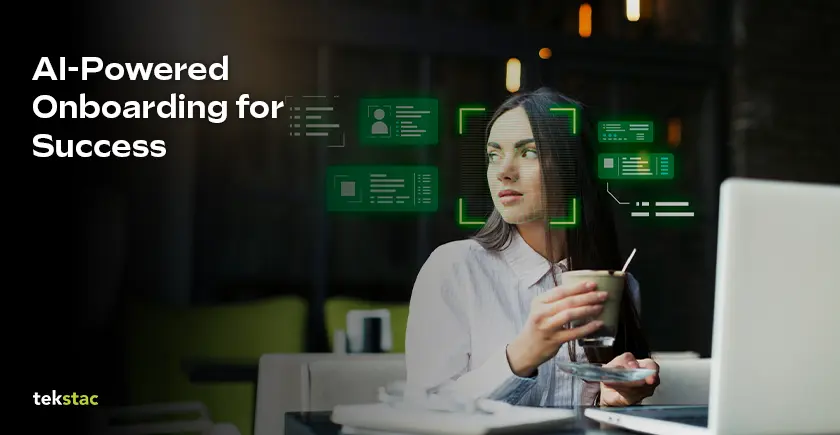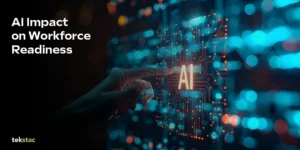AI-Powered Onboarding: How Smart Automation Enhances New Hire Experiences
April 11, 2025

New Era for New Hires
A new employee walks through the virtual doors of an organization, greeted not by piles of paperwork but by an intelligent assistant that knows their role, preferences, and needs. This is not a scene from the future; it’s the power of AI-powered onboarding, reshaping first impressions and setting new standards for employee integration.
The Importance of Onboarding
Onboarding is much more than just paperwork and introductions; it’s the foundation of a positive employee-employer relationship. According to Brandon Hall Group research, organizations with a robust onboarding process improve new hire retention by 82% and productivity by over 70%.
Despite this, a Gallup survey found that only 12% of employees strongly agree that their company does a great job onboarding new hires. This discrepancy highlights a major gap in traditional onboarding methods, which are often inconsistent and ineffective.
AI-powered onboarding addresses these challenges by streamlining processes, enhancing personalization, and ensuring consistency, all while reducing the burden on HR teams. Let’s explore how this innovative approach is reshaping the onboarding landscape.
Key Benefits of AI-Powered Onboarding
1. Streamlined Administrative Tasks
One of the significant advantages of AI in onboarding is its ability to automate repetitive administrative tasks. From generating offer letters to collecting required documents, AI-powered tools can handle these processes efficiently, allowing HR professionals to focus on more strategic aspects of onboarding.
For instance, AI chatbots can guide new hires through document submissions, answer frequently asked questions, and provide real-time support. This streamlines the process while ensuring all critical steps are consistently followed. A report from Aberdeen Group found that best-in-class onboarding processes, often backed by automation, improve employee engagement by 54%.
2. Personalized Learning and Training
Every employee has unique needs, learning styles, and learns at a different pace. AI-powered onboarding platforms use data analytics to tailor training programs to individual requirements. By analyzing an employee’s role, skills, and prior experience, these systems can recommend specific learning modules, courses, and resources.
Personalized onboarding ensures that employees receive relevant training, helping them acquire the skills needed for their roles faster. Moreover, it fosters a sense of belonging by demonstrating the company’s commitment to their growth. According to LinkedIn’s 2022 Workplace Learning Report, 94% of employees say they would stay at a company longer if it invested in their learning and development.
3. Improved Employee Engagement
AI-powered tools can create interactive and engaging onboarding experiences. Virtual reality (VR) tours, gamified learning modules, and AI-driven simulations make the process more enjoyable and memorable. For example, a new hire could participate in a virtual tour of the office or complete a gamified challenge that introduces them to company policies.
Such initiatives not only make onboarding more engaging but also leave a lasting impression, helping new employees feel connected to the organization from the start.
4. Data-Driven Insights
AI-powered platforms provide HR teams with valuable insights into the onboarding process. By tracking metrics such as training completion rates, employee feedback, and time-to-productivity, organizations can identify areas for improvement and make data-driven decisions.
These insights also enable proactive interventions. For example, if a new hire is struggling with a particular training module, the system can alert HR or suggest alternative resources to address the challenge. A report by the Harvard Business Review highlights that organizations leveraging data-driven onboarding processes can reduce employee turnover by up to 50%.
5. Consistency Across Locations
For organizations with multiple offices or remote teams, maintaining consistency in onboarding can be challenging. AI-powered platforms ensure that every new hire, regardless of location, receives a standardized and high-quality onboarding experience. Automated workflows and digital tools make it easy to replicate successful onboarding practices across different settings.
AI-Powered Tools Revolutionizing Onboarding
Several AI-powered tools and technologies are driving the transformation of onboarding processes. Here are some notable examples:
- Chatbots and Virtual Assistants: These tools provide instant support to new hires, answering questions, guiding them through processes, and ensuring timely task completion. According to Gartner, by 2025, 75% of HR inquiries will be handled by conversational AI chatbots.
- Learning Management Systems (LMS): AI-enhanced LMS platforms offer personalized learning paths, track progress, and provide interactive content tailored to individual roles. Companies using AI-powered LMS have reported a 60% increase in learning efficiency, according to Deloitte.
- Virtual Reality (VR): VR technology creates immersive onboarding experiences, such as virtual office tours or role-specific simulations, enhancing understanding and engagement. PwC research found that employees trained with VR were 4 times faster to complete training than in a traditional classroom setting.
- Natural Language Processing (NLP): NLP-powered tools analyze employee feedback and sentiment, helping HR teams identify potential concerns and improve the onboarding process. Studies show that AI-driven sentiment analysis can increase employee satisfaction scores by 30%.
Overcoming Challenges in AI-Powered Onboarding
While AI-powered onboarding offers numerous benefits, it’s not without challenges. Organizations must address concerns related to data privacy, integration, and user adoption to fully realize its potential.
1. Data Privacy and Security
Handling sensitive employee data requires robust security measures. Organizations must ensure that AI-powered platforms comply with data protection regulations and implement encryption, access controls, and regular audits to safeguard information. According to IBM , the average cost of a data breach in 2023 was $4.45 million, making security a top priority.
2. Integration with Existing Systems
Seamless integration with existing HR and IT systems is crucial for the success of AI-powered onboarding. Companies should invest in scalable and compatible solutions that can work with their current infrastructure. Research from SHRM indicates that 60% of HR professionals struggle with technology integration issues, which can hinder onboarding success.
3. User Adoption
Introducing new technology can sometimes face resistance from employees and HR teams. Providing training and demonstrating the tangible benefits of AI-powered onboarding can help drive adoption and ease the transition. Studies show that organizations offering technology training experience a 40% higher adoption rate for new digital tools.
The Future of Onboarding
As AI technology continues to evolve, the future of onboarding looks promising. Here are some trends to watch:
- Predictive Analytics: AI systems will predict employee needs and potential challenges, enabling HR teams to proactively address them.
- Hyper-Personalization: Advanced AI algorithms will deliver even more tailored experiences, considering factors such as cultural background, career goals, and personal preferences.
- Integration with Employee Lifecycle Management: AI-powered onboarding will seamlessly connect with other HR processes, such as performance management and career development, creating a cohesive employee experience.
Final Thoughts!
AI-powered onboarding represents a paradigm shift in how organizations integrate new hires. By automating administrative tasks, personalizing learning experiences, and providing valuable insights, it enhances the efficiency and effectiveness of the onboarding process. While challenges exist, they are outweighed by the significant benefits that AI brings to the table.
As organizations strive to attract and retain top talent in an increasingly competitive landscape, embracing AI-powered onboarding is no longer a choice but a necessity.
Platforms like Tekstac are at the forefront of this transformation, offering comprehensive onboarding solutions that combine AI-driven content delivery, personalized learning paths, skill assessments, and intelligent reporting. Tekstac enables organizations to not only onboard with efficiency but also nurture long-term talent development from the very beginning.





